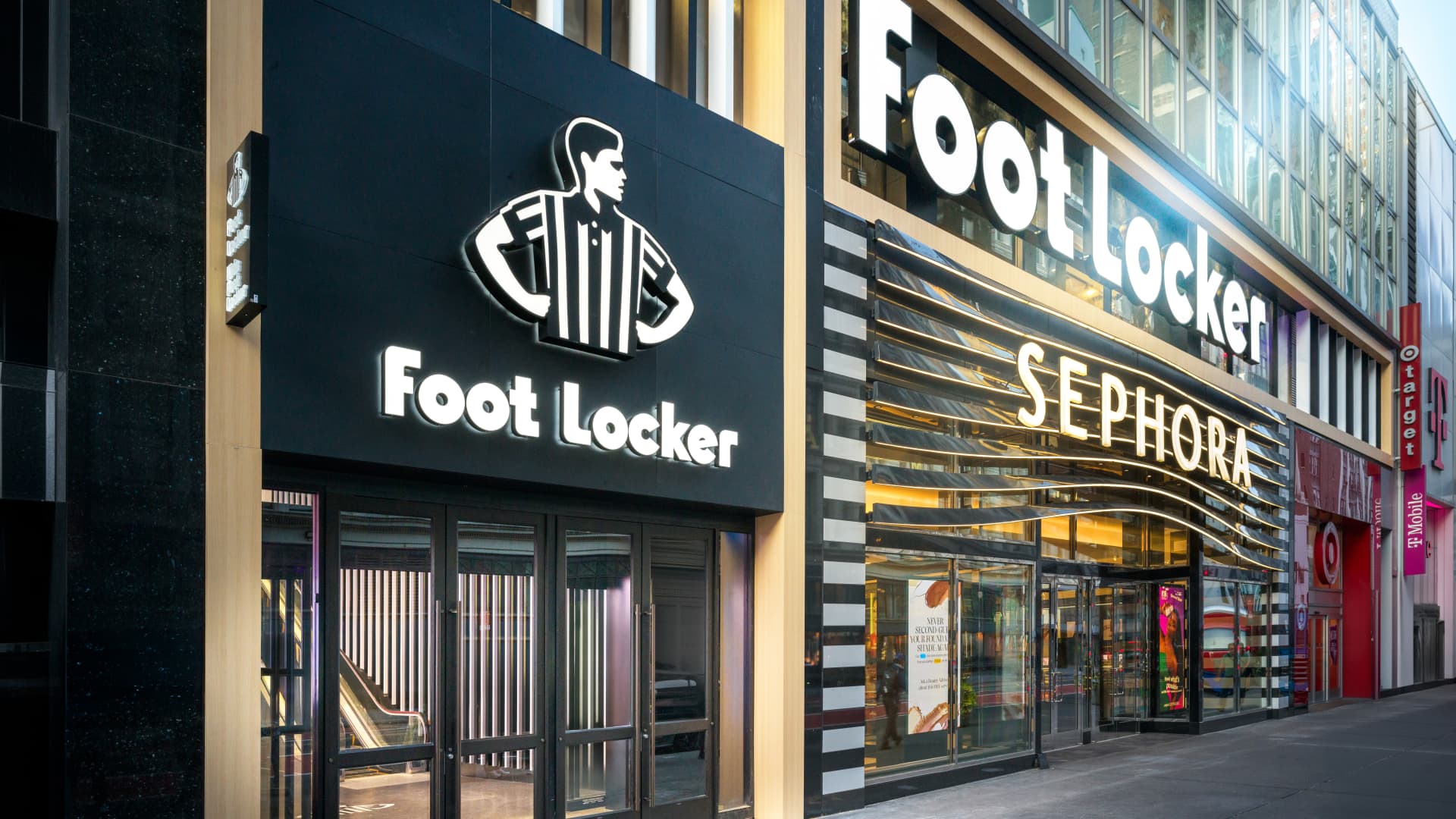Foot Locker store location on 34th street in New York City.
Courtesy: Foot Locker
Foot Locker slashed its full-year guidance on Wednesday after reporting a rough set of quarterly results that could be a warning sign for its largest brand partner Nike.
The sneaker giant fell short of Wall Street’s expectations on the top and bottom lines and blamed the miss on soft consumer demand and elevated promotions across the marketplace. The company also saw “softness” at Nike, CEO Mary Dillon told CNBC in an interview.Â
“There are definitely some brands that we’re seeing comp gains, and then, you know, we’re also contending with some more recent softness out of Nike,” said Dillon. “Given their size and scale, it kind of makes sense that it would have an impact.”Â
Foot Locker shares dropped 15% in premarket trading after it posted the results.
Here’s how Foot Locker did in its third fiscal quarter compared with what Wall Street was anticipating, based on a survey of analysts by LSEG:
- Earnings per share: 33 cents adjusted vs. 41 cents expected
- Revenue: $1.96 billion vs. $2.01 billion expected
In the three months ended Nov. 2, Foot Locker swung to a loss of $33 million, or 34 cents per share, compared with earnings of $28 million, or 30 cents per share, a year earlier. Excluding one-time items related to impairment charges for its atmos brand and other expenses, Foot Locker reported earnings of $31 million, or 33 cents per share.Â
Sales dropped to $1.96 billion, down about 1.4% from $1.99 billion a year earlier.Â
Dillon explained that consumers are showing up for key shopping moments, such as back-to-school and the recent stretch between Thanksgiving and Cyber Monday, but pulling back in between those events, making the peaks and valleys sharper than expected. Foot Locker is also dealing with slow demand for Nike, which is trying to turn around its business after relying too heavily on the same styles to drive sales.Â
Nike veteran Elliott Hill took the helm of the company less than a month ago, and Wall Street has not yet heard his strategy. Given Foot Locker’s performance during its third quarter, Nike could post another set of less-than-stellar quarterly results when it reports on Dec. 19.
Nike is Foot Locker’s largest brand partner, accounting for about 60% of sales. If Nike is struggling, Foot Locker will inevitably suffer, too.Â
“It’s not like across the board with all brands. Frankly ⦠I would just say that there’s some that are more promotional, but in total, the category is pretty promotional,” said Dillon. “There’s an elevated promotional level in this category that we hadn’t forecasted to be as it is.”Â
She reiterated that Foot Locker’s relationship with Nike and its new CEO is “very strong” and expects the slow demand to be a blip as Hill gets his footing.Â
“We have a great relationship with him [and] feel very confident about where he and his team are going,” said Dillon. “I think we’re going to work through all that, that’s the thing.”
Rough guidance
Given the tough situation with Nike and the pressures facing Foot Locker’s lower-income consumer, the company slashed its guidance for the full year and issued a disappointing holiday forecast.
For the holiday quarter, Foot Locker expects sales to be down between 1.5% and 3.5%, compared to a gain of about 2% in the year-ago period. The company said the previous fiscal year had an additional sales week.
Foot Locker’s guidance range is mostly worse than the 1.6% decline that analysts had expected, according to LSEG. The company also anticipates comparable sales will rise between 1.5% and 3.5%, largely below expectations of 3.4% growth, according to StreetAccount.Â
For the full year, Foot Locker now expects sales to fall between 1% and 1.5%, compared to previous guidance of down 1% to up 1%. Analysts were expecting a decline of 0.4%, according to LSEG.
The retailer also cut its comparable sales outlook for the full year and now anticipates comps will grow between 1% and 1.5%, compared to previous guidance of 1% to 3%. Analysts expected the metric would climb 1.8%, according to StreetAccount.Â
Foot Locker also lowered its full-year earnings outlook and now expects adjusted earnings per share to be between $1.20 and $1.30, below Wall Street expectations of $1.54. Foot Locker previously expected earnings to be between $1.50 and $1.70 per share.Â
The company attributed the revised guidance, in part, to elevated promotions and the shorter year, which is expected to impact sales by about $100 million.Â
Despite the slashed guidance and gloomy holiday outlook, there were some bright spots during the period. For the second quarter in a row, Foot Locker’s comparable sales grew compared to the previous year, with a 2.4% increase. That’s below the 3.2% analysts expected, according to StreetAccount, but it’s one indicator that Dillon’s turnaround plan is continuing to show signs of life.
Champs, which has been dragging down Foot Locker’s overall business, also posted positive comparable sales at 2.8% growth, as did WSS, which saw an increase of 1.8%.
During the quarter, Foot Locker’s gross margin also improved by 2.3 percentage points, thanks to fewer promotions than during the year-ago period, and it saw the highest conversion it has all year, said Dillon.Â
The former Ulta Beauty boss added the company is planning to continue to use its cash on hand to finance its store refurbishment programs and is feeling “really good” about the progress it’s made.
“It is a bit of a tale of two worlds, which is that we feel like what we’re doing is really working well, but in the marketplace that we’re seeing right now, we think this is the right call,” said Dillon of the decision to cut guidance. “It doesn’t shake our confidence in where we’re heading with the Lace Up Plan and it doesn’t shake our confidence that these are the right things to do.”

